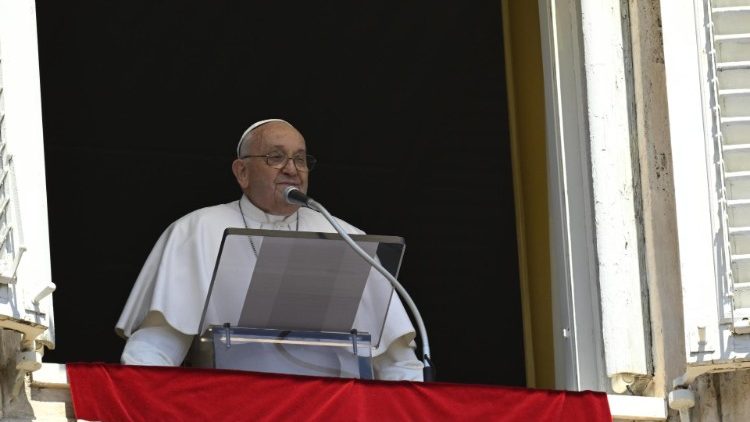Pope at Angelus calls for weapons to be stopped in Gaza, ‘Enough! Enough, brothers’
During the Marian prayer, Pope Francis spoke again about the war in the Middle East. "Every human being is sacred,” he said. He also called for the release of the hostages, many of whom are “elderly and children." He also lamented the civil war in Sudan with its millions of displaced people and refugees, calling “for peaceful solutions"
Vatican City (AsiaNews) – Pope Francis spoke to the faithful gathered in St Peter’s Square for the Angelus about the ongoing conflict between Israel and Hamas, which risks escalating, fuelled by threats from Lebanon and Iran.
“Every human being, Christian, Jewish, Muslim, of any people or religion, every human being is sacred, is precious in the eyes of God and has the right to live in peace. Let us not lose hope: let us pray and work tirelessly so that the sense of humanity may prevail over hardness of heart.”
“May the weapons be stopped: they will never lead to peace, and may the conflict not widen! Enough! Enough, brothers!” Francis said.
The Holy Father said that every day he turns his thoughts to the "very serious situation" in the Middle East. He expressed closeness to all suffering people, both Palestinians and Israelis. "I embrace them in this dark moment," he added.
The pontiff also appealed for “far more" humanitarian aid to be sent to the "stricken population" in the Gaza Strip. Humanitarian pauses are not enough to allow people to flee southwards.
“[L]et the wounded be rescued immediately, let civilians be protected,” the pope urged. “May the hostages be freed, including the elderly and children,” he said from the window of the Apostolic Palace.
Greeting Ukrainian faithful in the square, many waving yellow and blue flags, he mentioned "tormented Ukraine". "Let us not forget her," he said. “I pray with you for peace in your beleaguered country.”
He turned his thoughts to Sudan, "in the throes of a civil war that shows no sign of abating, and which is causing numerous victims”.
This forgotten conflict is causing a “grave humanitarian situation” with “millions of internally displaced people and refugees in neighbouring countries,” Francis said. “Let us not forget these brothers and sisters of ours who are in distress!
In an appeal to local leaders, he called for easy “access to humanitarian aid and, with the contribution of the international community, to work in search of peaceful solutions.”
Before the Angelus, the pope commented on the Word of the day (Mt 25:1-13), which offers "a story regarding the meaning of life of each person,” from the parable of the ten virgins.
Of these ten, five are wise and five are foolish. The former take the oil with them to go out "to meet the bridegroom", the latter do not. Francis dwelt on the difference between wisdom and foolishness, which does not lie in "goodwill" but in "preparation."
“Here is the difference: the oil. And what is one of the characteristics of the oil? That it cannot be seen: it is inside the lamps, it is not conspicuous, but without it the lamps have no light.”
It is important, according to Jesus, to understand that wisdom is not apparent, but lies “elsewhere: in taking care of what cannot be seen, but which is more important, taking care of the heart. Wisdom means appreciating silence, “so as to be capable of listening to ourselves and others.”
“It means knowing how to give up some of the time passed in front of the telephone screen to look at the light in the eyes of others, in one’s own heart, in God’s gaze upon us. It means not falling into the trap of activism, but devoting time to the Lord”.
Today’s Gospel offers some precious advice, do “not to neglect the oil of inner life, the ‘oil of the soul’.”
Foolish virgins in times of need have to go and buy oil to put it in lamps. This happens precisely because pf a lack of preparation and care.
For the pontiff, “the inner life must be prepared by dedicating a little time every day, with constancy, as one does for every important thing.”
Finally, Francis urged the faithful to devote time not only to "concrete plans," which are "good things," but also "to the care of the heart, to prayer and to the service of others, to the Lord who is the destination of life."







.png)










